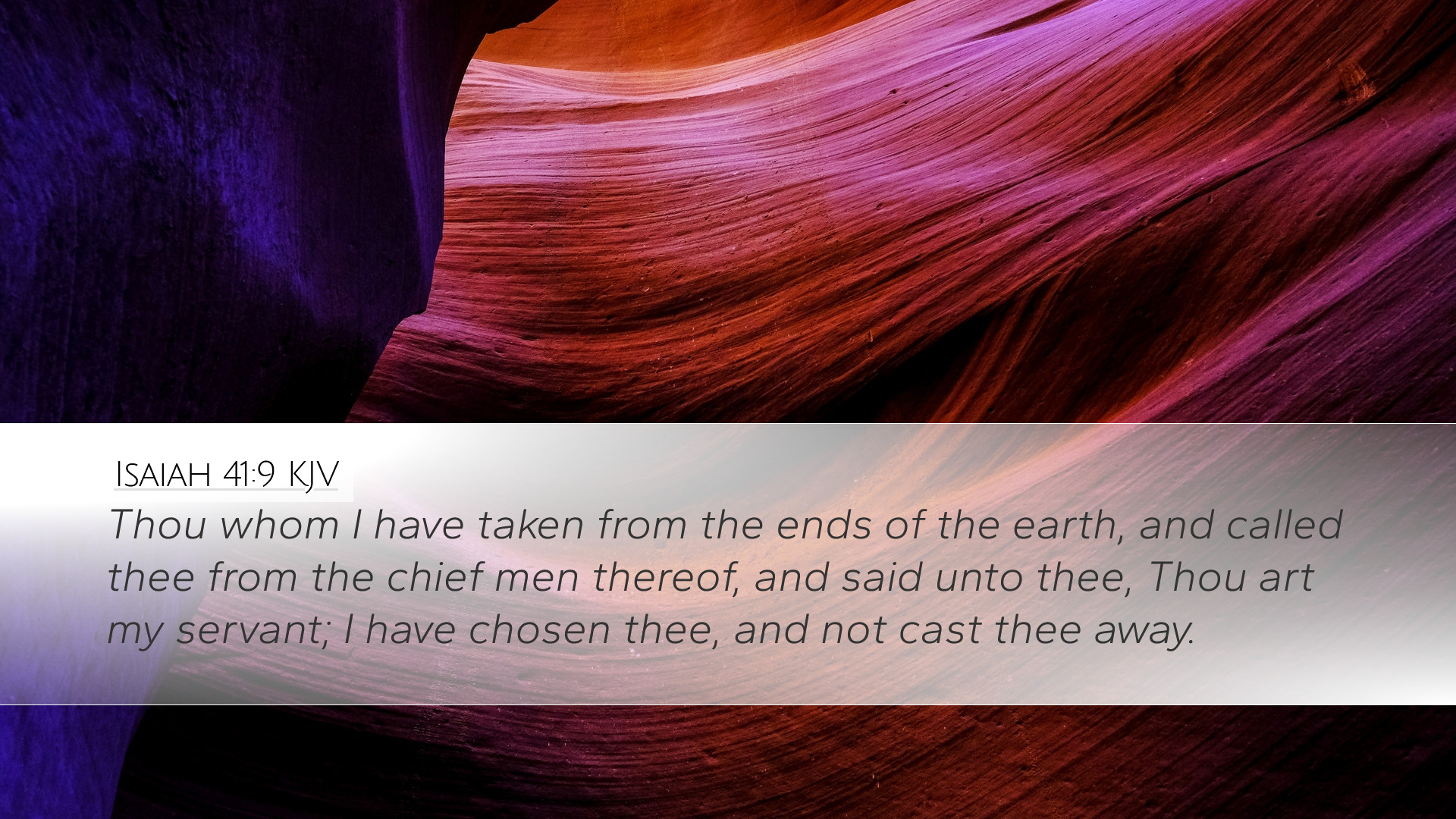Commentary on Isaiah 41:9
Verse: "Thou whom I have taken from the ends of the earth, and called thee from the chief men thereof, and said unto thee, Thou art my servant; I have chosen thee, and not cast thee away."
Introduction
Isaiah 41:9 is a profound verse capturing God's choice of His people, emphasizing the grace and purpose behind His calling. This verse not only reassures the individual believer but also serves as a majestic proclamation of God's sovereign will in selecting a servant to fulfill His divine purposes. Insights from notable public domain commentaries will explore the depth of this message.
Contextual Background
Chapter 41 unfolds during a time when Israel faced significant existential threats. The prophet Isaiah, as God’s mouthpiece, consoles Israel and fortifies her faith in God's unbroken covenant. This chapter underscores the contrast between the helplessness of idols and the power of the living God who called Israel as His chosen instrument to the nations.
Exegesis of Isaiah 41:9
- Divine Selection: Matthew Henry notes that God's selection of Israel is not a choice made out of privilege but one of purpose. It reflects God's initiative in grace, illustrating that He chooses the weak to confound the strong (1 Corinthians 1:27).
- From the Ends of the Earth: The phrase “from the ends of the earth” implies that God's calling encompasses all of humanity, emphasizing His universal authority. Albert Barnes elaborates that God’s purpose is not limited geographically but extends across all nations, asserting His sovereignty over all creation.
- Servanthood: The title “my servant” indicates a unique relationship between the Servant and God. Adam Clarke suggests that servanthood here embodies loyalty, trust, and submission to God’s will, leading to blessings not just for the individual but also for Israel as a collective body.
- Assurance of Presence: The assurance "I have chosen thee, and not cast thee away" provides profound comfort. Henry emphasizes this point, noting the constancy of God’s presence, contrasting the lapses in human commitment with God's unwavering faithfulness.
Theological Significance
The theological theme present in Isaiah 41:9 reveals God’s covenantal love and His desire for relationship with His people. This choice reflects not only God’s grace but also a calling for His people to respond in faith, embodying the attributes of a true servant. The implications are vast in terms of biblical theology, shaping the understanding of God's sovereignty, redemptive history, and the identity of the people of God.
Pastoral Applications
- Identity in Christ: Pastors can encourage their congregations to embrace their identity as chosen servants of God. This should inspire believers to live purposefully, understanding that they are called to be representatives of God’s love and truth in the world.
- God's Faithfulness: The assurance that God does not abandon His chosen can serve as a powerful sermon point. In the face of personal struggles, leaders can remind their congregations that they remain secure in their identity and purpose before God.
- Encouragement in Evangelism: Just as Israel was called to be a light to the nations, Christians are similarly mandated (Matthew 5:14). The church can explore this as a community calling to engage the world, informed by the conviction that God has called them from all walks of life.
Conclusion
Isaiah 41:9 serves as a profound reminder of God’s ongoing work in the world, capturing a significant element of biblical identity and purpose. Through a deeper understanding of this text and its implications, pastors, students, theologians, and Bible scholars can unlock layers of meaning that provoke faithful living and joyful service. The combined insights from commentators such as Matthew Henry, Albert Barnes, and Adam Clarke elucidate the undeniable truth that God’s call is an empowering promise that emboldens believers to take active roles in His unfolding plan of redemption.


